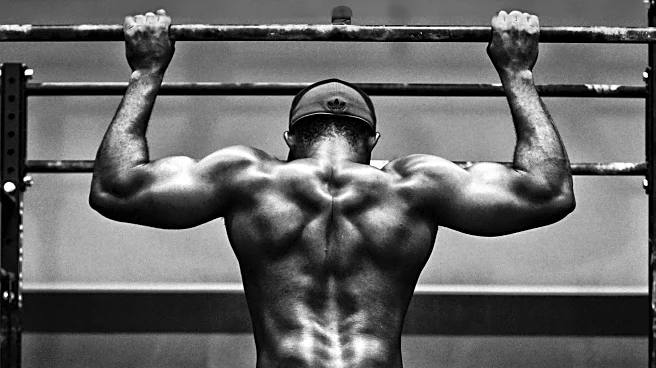What's Happening?
Felicia Hernandez, a NASM-certified personal trainer, has introduced an eight-minute morning bodyweight workout designed to build strength for individuals over 50. This routine emphasizes the importance of maintaining muscle mass to prevent age-related declines such as falls, fractures, and insulin resistance. Hernandez highlights that bodyweight exercises can be as effective as machines and free weights, offering a sustainable way to incorporate strength training into daily life without the need for expensive gym memberships or equipment. The workout includes exercises like squats, wall pushups, glute bridges, plank hold progressions, and standing marches with arm circles, each performed for one minute with intervals of work and rest.
Why It's Important?
The introduction of this bodyweight routine is significant as it addresses the common issue of muscle loss in older adults, which can lead to decreased mobility and increased risk of chronic diseases. By promoting a simple and accessible workout, Hernandez aims to empower individuals over 50 to maintain their independence and lead active lives. The routine's focus on functional movements helps strengthen stabilizing muscles, which are crucial for daily activities and overall health. This approach not only supports physical well-being but also contributes to mental health by encouraging consistent exercise habits.
What's Next?
As more individuals over 50 adopt this bodyweight routine, there may be increased interest in similar accessible fitness programs tailored to older adults. Fitness centers and health clubs might consider offering classes or resources that focus on bodyweight exercises, catering to the growing demographic seeking effective and sustainable workout options. Additionally, healthcare providers could recommend such routines as part of preventive measures against age-related health issues, potentially influencing public health policies to support active aging.
Beyond the Headlines
The emphasis on bodyweight exercises highlights a shift towards more inclusive fitness practices that accommodate various physical abilities and economic backgrounds. This trend could lead to broader acceptance of non-traditional exercise methods, encouraging innovation in the fitness industry. Furthermore, the routine's focus on functional movements may inspire research into the long-term benefits of bodyweight training for older adults, potentially influencing future fitness guidelines and recommendations.










